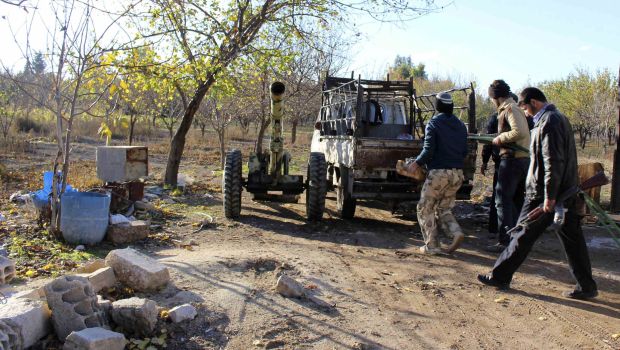
Free Syrian Army fighters walk in eastern Ghouta, Damascus on December 10, 2013. (REUTERS/Ammar Al-Erbeeni)
London/Beirut, Asharq Al-Awsat—The US and UK have halted delivery of non-lethal aid to rebels in northern Syria amid confusion over the whereabouts of Free Syrian Army (FSA) Chief of Staff General Salim Idris.
Media reports on Thursday claimed that Idris had fled Syria following the eruption of fighting between the Western-backed FSA, the main military wing of the Syrian opposition movement, and the newly formed Islamic Front, a coalition comprised of seven major Islamist rebel groups fighting in Syria.
The US and UK took the decision after the Islamic Front seized bases and warehouses belonging to the FSA at the Bab Al-Hawa crossing along the border between Turkey and Syria. The Islamic Front, which has previously said that it aims to establish an Islamic state in Syria, seized arms and non-lethal assistance that had been in the hands of the FSA, prompting the West to rethink assistance plans.
Commenting on the decision to suspend aid, White House spokesman Josh Earnest said: “We have seen the reports that Islamic Front forces have seized the headquarters in question and warehouses belonging to the Supreme Military Council, and we’re obviously concerned by those reports.”
“We’re still gathering facts and consulting with General Idris and the Supreme Military Council staff to inventory the status of US equipment and supplies that have been provided to the SMC.”
In response to the growing rebel infighting, Turkey announced that it is closing its borders with Syria in the region.
Speaking to Asharq Al-Awsat on the condition of anonymity, a Turkish diplomatic source affirmed that Ankara’s decision to close its side of the borders was a “temporary precautionary measure,” adding that the Turkish authorities are closely monitoring the situation in the region and studying the measures that must be taken.
In exclusive comments to Asharq Al-Awsat, FSA spokesman Luay Al-Miqdad described the US decision as “rash,” calling on the Obama administration to reconsider.
Miqdad revealed that “some sides in the [Syrian] opposition have been communicating with the US Department of State in a bid to establish a middle ground with regards to the decision of suspending assistance.”
“If the US decision to provide non-lethal assistance, which was limited to relief material and some equipment, required several months, how can the decision to cancel it take only a few hours?” he asked.
“The Syrian people need this assistance particularly as winter is coming,” he continued.
Miqdad sought to downplay the battle between the FSA and the Islamic Front, which the London-based Syrian Observatory for Human Rights said had resulted in at least five deaths.
He said that “the Supreme Military Council of the FSA understands America’s concerns over the misunderstanding between the opposition factions,” but insisted that “all points of contention” could be resolved.
He also added that meetings between General Idris and the Islamic Front were currently ongoing.
Syrian National Coalition member Michel Kilo attempted to downplay the importance of the decision to suspend aid.
“US assistance was not of any importance on the military level,” he said. “Especially given that it was limited to communication equipment which can be bought anywhere.”
According to Kilo, the US decision confirms that Washington was reconsidering its stance towards the FSA.
“[Washington] refused to arm the FSA, and now the Islamists have become the most powerful military element on the ground,” he added.
Although he acknowledged the shortcomings of FSA battalions and their shortage of ammunition, Kilo insisted that the FSA still possessed some capabilities in addition to “the national will,” a factor which he said would enable it “to rescue the revolution from sliding into a struggle between the regime and extremist powers.”
In the past, US and UK deliveries to the FSA have included communication equipment and laptops.
Earlier this month, tensions escalated when the newly-forged alliance broke away from the FSA’s Supreme Military Council (SMC).
